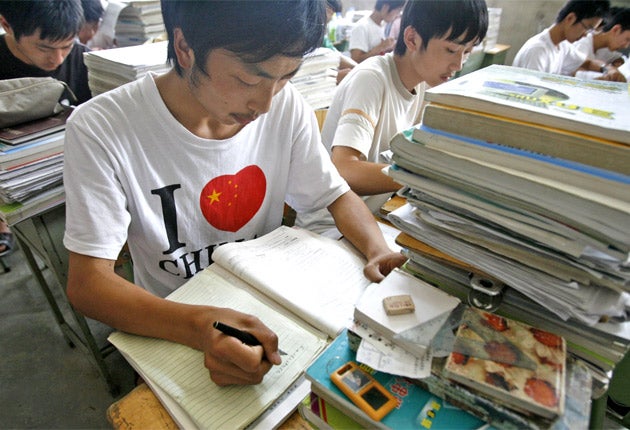British schools slump in global league table

Your support helps us to tell the story
From reproductive rights to climate change to Big Tech, The Independent is on the ground when the story is developing. Whether it's investigating the financials of Elon Musk's pro-Trump PAC or producing our latest documentary, 'The A Word', which shines a light on the American women fighting for reproductive rights, we know how important it is to parse out the facts from the messaging.
At such a critical moment in US history, we need reporters on the ground. Your donation allows us to keep sending journalists to speak to both sides of the story.
The Independent is trusted by Americans across the entire political spectrum. And unlike many other quality news outlets, we choose not to lock Americans out of our reporting and analysis with paywalls. We believe quality journalism should be available to everyone, paid for by those who can afford it.
Your support makes all the difference.The UK is sliding down an international table measuring reading, maths and science standards around the world, a major report revealed yesterday.
The highly respected Pisa (Programme for International Student Assessment) showed Britain had slumped to 28th place in maths, 25th in reading and 15th in science. This compared to 24th, 17th and 14th place respectively the last time the survey was conducted four years ago.
In 2000, the year the survey began – carried out with tests in the three subjects on 15-year-olds – the UK was fourth in science, seventh in reading and eighth in maths.
Education Secretary Michael Gove immediately went on the offensive to say that millions of pounds invested in schools under Labour had not produced "value for money".
"Despite massive investment over the last 13 years we haven't been improving at the rate we should have been," he said.
Andreas Schleicher, from the Organisation for Economic Co-operation and Development, which published the report, said it was more a case of the UK "stagnating" while other countries improved their performance.
Key reasons cited for the UK's lower position included the fact that the percentage of disadvantaged children who were improving their performance was lower than the international average – 22 per cent compared with 30 per cent.
Moreover nearly one in five children were at a level in both maths and English where their standards were so low that it was likely to cause them problems in gaining employment upon leaving school. "We call these students at risk," Dr Schleicher said. "They will find it tough to switch from education to work."
Dr Schleicher also said that discipline in some schools in the UK was hampering efforts to improve standards. In the least disciplined classrooms there was a 1.8 per cent bigger chance of children being low performers in the tests.
The only crumb of comfort for the UK is that more countries were studied this year – thus they were 29th out of 65 in maths compared with 24th out 54 in 2006.
A breakdown of the figures also revealed that Wales was bottom of all four UK countries in all three subjects – with an average score of 476 in the reading test compared with 495 for England (just above the international average of 492). There was no statistical difference between the performances of children in Scotland, Northern Ireland and England.
Mr Gove said the findings could lead to Wales reviewing its policies as it had abandoned national curriculum tests and league tables.
Britain's independent schools outshone their state school rivals. However, Dr Schleicher said this was down to their social intake rather any improved teaching quality. "There is a close relationship between social background and learning outcomes. Once social background is removed, their performance is similar," he said.
Mr Gove claimed the survey's findings were "a ringing endorsement of everything the Coalition Government wants to do in education".
"We've been attacked for requiring a greater degree of transparency about the way in which academic results are published," he added, "but it's clear that if you give schools a greater degree of freedom and you require the public posting of data, then you get the best results."
Sweden, which Mr Gove has said gave him the idea for his plans to set up "free schools" run by teachers, parents and charities, had slipped down the OECD rankings from 507 points in 2006 to 497 – just above average.
Internationally, the strongest performing countries were Hong Kong-China, Singapore, Canada, New Zealand and Japan.
The Chinese province of Shanghai took part for the first time and scored higher in reading than any other country in the world.
Join our commenting forum
Join thought-provoking conversations, follow other Independent readers and see their replies
Comments